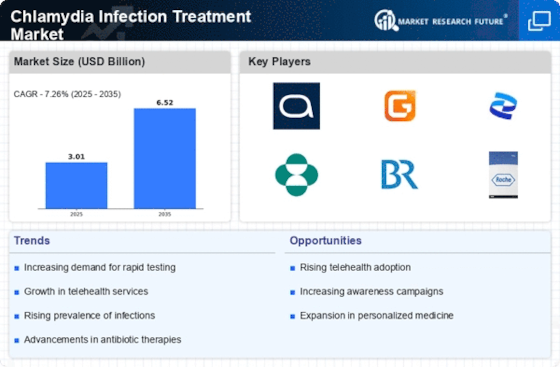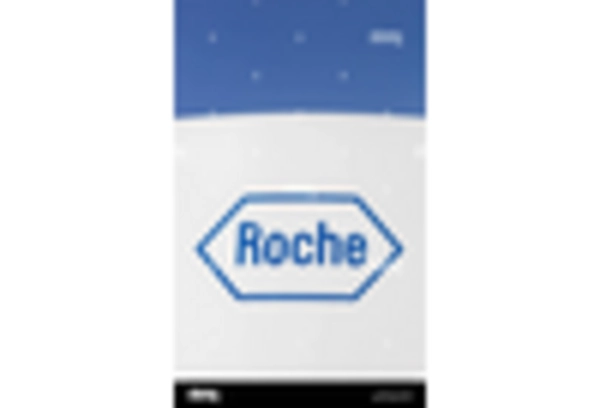Government Initiatives and Funding
Government initiatives aimed at combating sexually transmitted infections, including chlamydia, play a crucial role in shaping the Chlamydia Infection Treatment Market. Various health departments have launched campaigns to promote screening and treatment, which are often supported by funding for public health programs. For instance, initiatives that provide free or subsidized testing and treatment services have been implemented in numerous regions, thereby increasing access to care. This financial support not only enhances the availability of treatment options but also encourages healthcare providers to adopt new therapies. The commitment of governments to reduce the burden of chlamydia infections through policy and funding is likely to drive growth in the Chlamydia Infection Treatment Market, as more individuals seek treatment and preventive measures.
Rising Incidence of Chlamydia Infections
The increasing prevalence of chlamydia infections is a primary driver for the Chlamydia Infection Treatment Market. According to recent data, chlamydia remains one of the most commonly reported sexually transmitted infections, particularly among young adults aged 15 to 24. This demographic accounts for a significant proportion of new cases, which has prompted healthcare providers to focus on effective treatment options. The rise in infection rates necessitates a corresponding increase in treatment availability, thereby expanding the market. Furthermore, the growing recognition of the long-term health implications associated with untreated chlamydia, such as infertility and pelvic inflammatory disease, underscores the urgency for effective treatment solutions. As awareness continues to grow, the demand for innovative therapies and medications within the Chlamydia Infection Treatment Market is likely to escalate.
Growing Acceptance of Telehealth Services
The growing acceptance of telehealth services is reshaping the landscape of the Chlamydia Infection Treatment Market. Telemedicine offers a convenient and accessible means for individuals to receive consultations, screenings, and prescriptions without the need for in-person visits. This is particularly beneficial for populations that may face barriers to accessing traditional healthcare services, such as those in rural areas or individuals with mobility issues. The COVID-19 pandemic has accelerated the adoption of telehealth, and this trend appears to be continuing as patients appreciate the flexibility and privacy it offers. As telehealth becomes a standard component of healthcare delivery, it is likely to enhance the reach of chlamydia treatment services, thereby expanding the Chlamydia Infection Treatment Market.
Increased Focus on Sexual Health Education
The heightened focus on sexual health education is a significant driver for the Chlamydia Infection Treatment Market. Educational programs aimed at raising awareness about sexually transmitted infections, including chlamydia, have become more prevalent in schools and community organizations. These initiatives emphasize the importance of regular testing and prompt treatment, which can lead to earlier diagnosis and intervention. As individuals become more informed about the risks associated with chlamydia, they are more likely to seek treatment, thereby increasing market demand. Furthermore, the integration of sexual health education into broader public health strategies is likely to foster a culture of proactive health management, further propelling the Chlamydia Infection Treatment Market forward.
Technological Advancements in Treatment Options
Technological advancements in treatment options are significantly influencing the Chlamydia Infection Treatment Market. The development of new antibiotics and alternative therapies has expanded the arsenal available to healthcare providers. Recent innovations include single-dose treatments that enhance patient compliance and reduce the risk of complications. Additionally, the emergence of personalized medicine approaches, which tailor treatments based on individual patient profiles, is gaining traction. These advancements not only improve treatment outcomes but also attract investment in research and development within the market. As healthcare systems increasingly adopt these innovative solutions, the Chlamydia Infection Treatment Market is poised for growth, driven by the demand for more effective and patient-friendly treatment modalities.
















